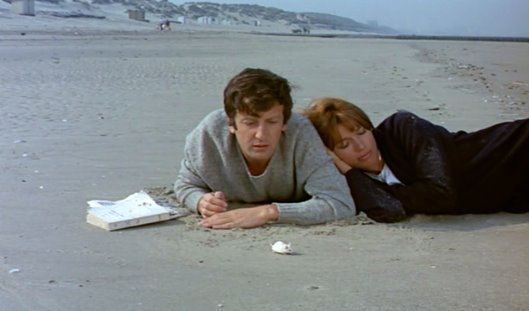Man’s main purpose on the planet is to make life comfortable for cats, explains Catrine to Claude in a scene from Alain Resnais’s Je t’aime Je t’aime. When you think about it, her theory is a remarkably calming one. This conversation is one of many moments of his past Claude revisits via a time travel experiment.
He is the first human to test this kind of time travel. Why the past, why not go to the future? Claude asks. Because there is still so much understand about how time works, explains a scientist. However, the scientists have already perfected the procedure with mice. Despite the fact that a mouse cannot talk and say where he’s been, they are confident that if the mouse could talk he would confirm he had indeed visited the past. Therefore the scientists reassure Claude by letting him know that if he were a mouse his chances of surviving the experiment would be 100%.
Claude agrees to it. He has nothing to lose. His recent suicide attempt was botched. Catrine, his girlfriend is dead (he thinks he killed her, and maybe he did). The scientists set him up in a groovy 1968 time travel cell that looks something like a plush bean bag chair inside a big,cushy boob. The time travel element to this film is amusingly convoluted (he will travel back one year in his past for exactly four minutes).
This isn’t science fiction, it’s an Alain Resnais film. It’s an experimental film about the role of memory in constructing a life. Memory is wonderfully unique to each individual. In Je t’aime Je t’aime Claude’s character comes to life through a mix of quirky, opaque, funny and touching moments that are out of sequence and out of context. Nevertheless, with these fragments a full character is drawn — a character with foibles and charms, drama and mystery.
Much of what Claude remembers / relives seems irrelevant or mundane, but isn’t that how memory works? Something insignificant or banal can have a world of sensuous meaning to the persons whose memory it is. Claude’s time travel opens with him emerging from a calm sea. He’s in flippers so he has to step awkwardly toward shore. It’s a beautiful day. He’s been snorkeling. He’s telling his girlfriend which fish he saw. This memory is his so I can really only speculate, but the moment is repeated throughout the film and seems to be a touchstone for a tangible sense of well being. Memory seems to function like an internal site of sensation that can be returned to after the time of the original instance of feeling has long past.
